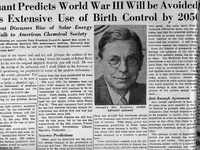A number of Harvard faculty members attacked the so-called “anti-subversive bill” that had passed the State House in October. The bill, they claimed, restricted academic freedom while remaining largely inept at tackling the genuine dangers posed by communism.
Speaking for those who feared encroachment on the principles of academic freedom, Samuel H. Beer, associate professor of Government, dismissed anti-subversive bills as mere publicity stunts by over-zealous lawmakers.
“They’re pure demagogy,” he said one evening at a Harvard-sponsored discussion, “aimed at trying to get votes and hitting the headlines. They have no utility value or need at all.”
More than 1,000 Harvard students agreed, signing a petition organized by Carrington and his prominent Liberal Union to protest the Massachusetts bill. Carrington described the measure as “unconstitutional and unnecessary in that the threat which it tries to meet has been over-exaggerated.”
The Crimson’s editorial page added its support, charging that the bill displayed “unprecedented naivete and illogic” and would force colleges to “operate under an atmosphere of fear and suspicion.”
Multimedia
Over their protests, Governor Paul A. Dever signed the bill into law on November 17.
Reds All Over?
The Cold War was at the forefront of many Harvard minds, not least because eight percent of the University’s financing came from government research contracts.
In contrast to Harvard’s tremendous involvement in the Second World War, when the University was involved in vast confidential research projects, participation in the struggle against Communism was piecemeal and fairly small-scale.
That year saw the Business School finally end its classified government experiments, seven years after the end of the Second World War.
Conant had taken a leave of absence from Harvard during the Second World War to personally contribute to J. Robert Oppenheimer’s ’26 Manhattan Project in Los Alamos, N.M., which led to the development of the atom bomb.
But in 1951-52, Conant was ensconced in Loeb House in 1951 to oversee the Harvard administration.
At the same time as Harvard scaled back its contribution, members of the Faculty found themselves unwittingly drawn into the conflict.
Several professors stood accused of having personal communist connections. Most prominently, Professor of History John K. Fairbank ’29 was not initially allowed to take a year’s sabbatical leave teaching in Japan because of supposed communist links.
Fairbank was accused by confessed ex-communists Elizabeth Bentley and Louis Budenz before the House Un-American Activities Committee of having had ties with the party. Although the Department of the Army did lift his travel restrictions in the spring of 1952, Fairbank was repeatedly attacked by critics as a communist sympathizer.
Read more in News
Sikh’s Sword Seized By School













